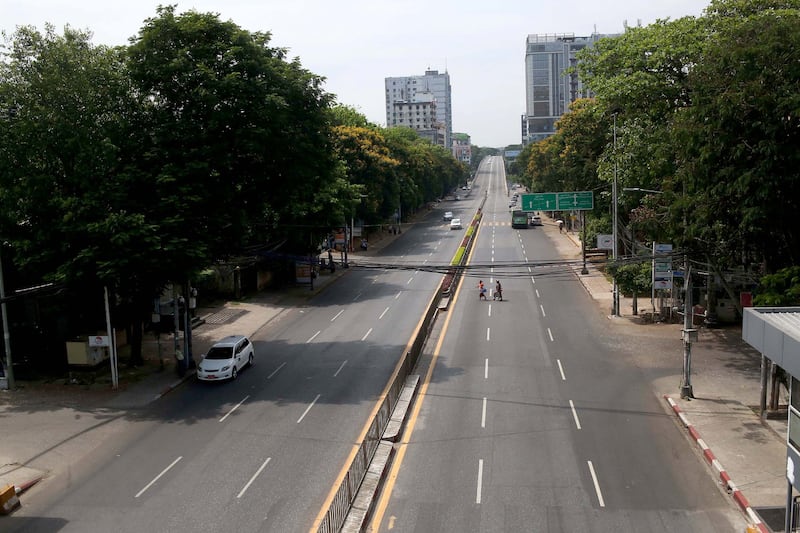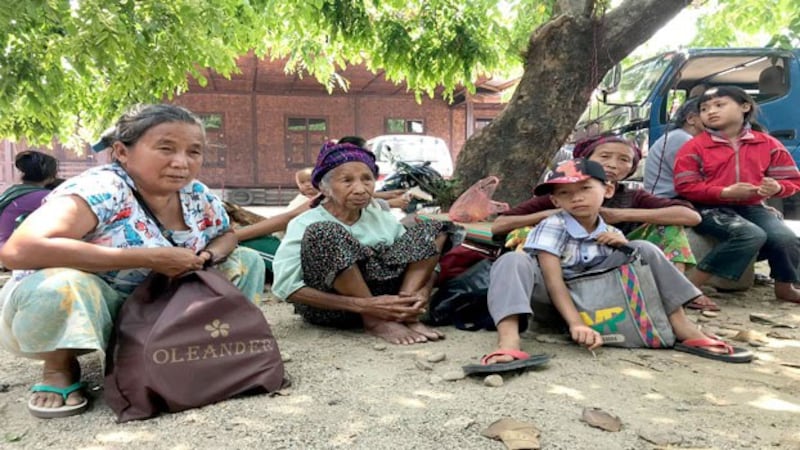Myanmar civilian politicians and activists launched a “National Unity Government” on Friday, centered on ousted national leader Aung San Suu Kyi and other lawmakers elected last November, to marshal domestic and international support for ending the bloody rule of the military junta.
The launch of the parallel government by the Committee Representing Pyidaungsu Hluttaw (CRPH), comprised of lawmakers ousted by the military coup in February, came as anti-coup protesters staged a “Silent Strike” that emptied the streets of major cities on the final day of the Burmese New Year holiday.
The nearly 11-week-old junta that deposed Aung San Suu Kyi and her elected government on Feb. 1 attacked protesters and civilians in cities in the Sagaing and Mandalay regions where resistance to military rule has been robust, killing at least eight people and leaving dozens missing.
The parallel government launched on Friday draws from National League for Democracy (NLD) legislators who won seats in the 2020 election that the military overturned, citing unsupported charges of electoral fraud, with wide representation by the country’s major ethnic groups, most of which have their own armies.
The CRPH -- whose name comes from the Pyidaungsu Hluttaw, the Burmese term for the lower house of parliament – was outlawed by the military regime, but enjoys support in Myanmar and abroad. The group is thought to operate near Myanmar’s borders with India and Thailand.
“Everyone needs to welcome the newly launched government wholeheartedly. We will connect with the world to work together,” said Min Ko Naing, founder of the 88 Generation Students Group of activists who fought the military dictatorship more than 30 years ago in what was then known as Burma.
“We are going through a very rough patch because we are trying to uproot the military regime this time. This is very exhausting and need lots of sacrifice,” said the 58-year-old activist.
Min Ko Naing, who called the coup a “violent and arrogant move,” serves as an adviser to the unity government, which will retain State Councilor Aung San Suu Kyi and President Win Myint in the positions they held before Feb. 1.
The CRPH tapped Mahn Win Khaing Than, an ethnic Karen and former House Speaker, as the country’s prime minister, overseeing 11 ministries, while lawyer Duwa Lashi La, president of the Kachin National Consultative Assembly, was named vice president, the group said in an announcement
During a live broadcast unveiling the new government, Lwin Ko Ko Latt, the new minister for home affairs and immigration, vowed to work with Myanmar’s ethnic armed groups as well as international organizations.
“We are fighting a battle based on domestic and international legitimacy,” he said.
“We can clearly see our domestic legitimacy in how much the people are supporting us. As for international legitimacy, the fact that no government has so far recognized the military terrorist group shows that they are neither the de facto nor the de jure as a government,” added Lwin Ko Ko Latt, and NLD lawmaker.

‘Disciplined, moral and ethical’
Yee Mon, defense minister in the parallel government, said the CRPH aims to form a professional People’s Defense Force in order to fight the military regime.
“Fundamentally, it has to safeguard the people. In addition, it has to safeguard the federal democratic union that we are trying to establish. The new defense force will be built on these principles,” he said Friday.
Yee Mon, an NLD lawmaker and poet, called for a “disciplined, moral and ethical” new defense force “that can replace the current military that has been terrorizing the people.”
“At some point, this People’s Defense Force will be a part of larger Federal Union Army,” he added.
The CRPH has said it plans to draw in ethnic armies based along multiethnic Myanmar’s borders with Bangladesh, China, India and Thailand that for decades have been fighting the national military, which is largely made up of majority Bamars, who account for two-thirds of Myanmar’s 54 million people.
Six of the 11 federal ministers are ethnic Kachin, Karen or Chin, while six deputy ministers come from the Kachin, Karen, Mon, Kayan, Karenni and Ta’ang ethnic groups, the Irrawaddy online news outlet reported.
“All will have a vitally important role to play in the great cause of liberating our nation from the scourge of this murderous military junta, and all will have equal rights as citizens of Myanmar,” Dr. Sa Sa, an ethnic Chin who serves as and the international envoy for the CRPH and was appointed international cooperation minister and spokesman for the unity government.
“With the right help from the rest of world, Burma has every chance to become not only a federal democracy but a peaceful, prosperous, and multicultural society,” tweeted historian Thant Myint-U. “(The) country is at an historic inflection and there is absolutely no going back.”
Two senior U.S. diplomats -- Atul Keshap, principal deputy assistant secretary for East Asian and Pacific Affairs, and Scott Busby, assistant secretary of state for Democracy, Human Rights, and Labor – tweeted that they and CRPH “agreed on the importance of restoring Burma’s path to democracy. The United States strongly supports the people of Burma, who reject military rule and yearn for peace.”
On Saturday, a U.S. State Department spokesperson added: "The United States commends the efforts of the members of the Committee to Represent the Pyidaungsu Hluttaw (CRPH), which is working in the interest of the people of Burma."
The CRPH has "brought together people from a wide range of groups across Burma, including members of ethnic minority groups," the spokesperson noted, while condemning the military junta.
"The regime’s actions are leading to greater instability, and mounting economic, health, and humanitarian crises, not to mention great suffering for the people of Burma," said the statement.
At least eight people were killed and at least 20 people missing across the country on Friday as anti-coup protesters staged “Silent Strike” on the fourth and final day of the traditional New Year Thingyan water festival.
In the Sagaing region town of Kani, at least six residents were killed last night and more than 20 others were missing, after a military convoy attacked villagers on security duty near the entrance to the town, villagers said.
“The military earlier stopped a car, beat up the driver and his friend, and took them away,” a local resident told RFA.
“The soldiers came in 12 military vehicles. A clash ensued with angry residents who fought back with home-made “tumee” rifles but, of course, they won,” he said.
“They must have used heavy weapons, too, because we heard loud bangs,” added the witness.
The Assistance Association for Political Prisoners, a Myanmar human rights group based in Thailand, said that as of Thursday, 728 people had been confirmed killed and 3,141 people were under detention by the military regime, with another 832 charged but evading arrest.

CDM police stay the course
In Sagaing’s Kalay, scene of heavy fighting since last week, a force of about 30 police and soldiers conducted house searches early Friday morning before evacuating in three trucks.
“They made house-to-house searches in the streets near the college campus. They checked household lists, looked for satellite dishes and asked if there were any weapons at home,” said a local resident, speaking on condition of anonymity.
In the town of Myingyan in the central region of Mandalay, two people were killed when police and soldiers fired some 200 rounds into six neighborhoods during the night, a resident said.
“The bodies of the two men looked terrible. They were disfigured, and it seemed they had been dragged away on the road,” the witness added.
The CRPH has both supported and drawn support from a nationwide Civil Disobedience Movement (CDM) of civil servants, transport workers, bankers, medical professionals and others who have stopped work to thwart the military’s efforts to govern the country.
Many CDM participants have been arrested, threatened with termination and hounded by the junta to return to work. Many have fled to areas controlled by armed ethnic groups to avoid being arrested.
In the eastern state of Kayah, near the Thai border, several of the more 200 police, including a captain, who have left their posts to join the CDM since Feb 10 told RFA Friday they will resist pressure to return to their units.
"We want to serve under a democratic government. We joined the CDM movement because we cannot accept the military dictatorship,” said a policeman from Prusoe Central Police Station.
Another policeman from the Loikaw District Police Chief’s Office who is now in hiding told RFA he would hold out despite the hardship.
“We are not getting our salaries, but the local people are feeding us. Though we have financial difficulties, we do not have to worry about food,” the officer said.
“We will fight back against the military and restore democracy.”
Reported by Soe San Aung and RFA’s Myanmar Service. Translated by Khin Maung Nyane and Ye Kaung Myint Maung. Written in English by Paul Eckert.
